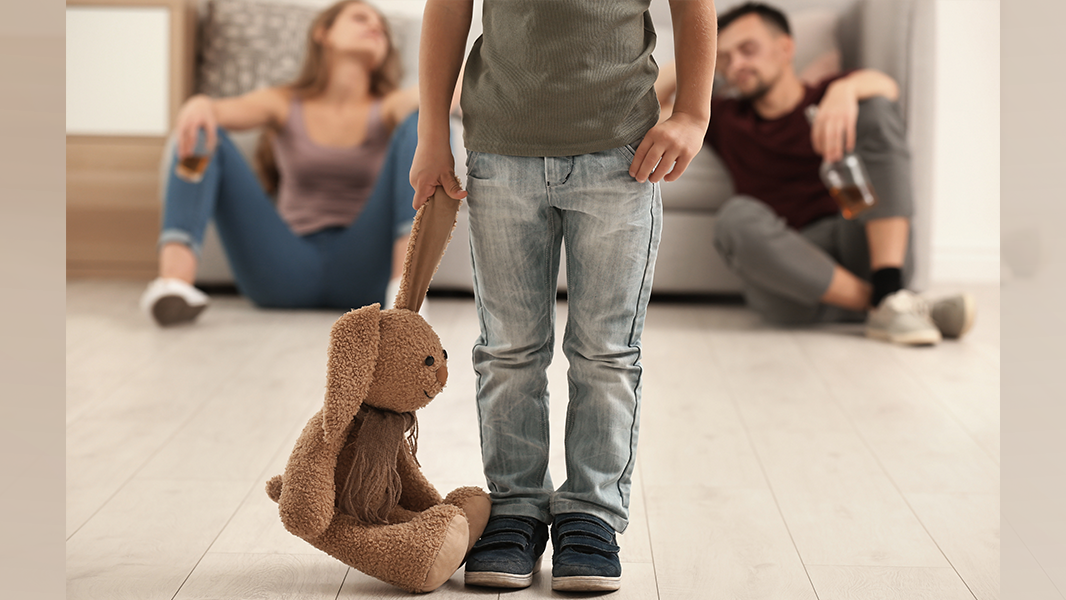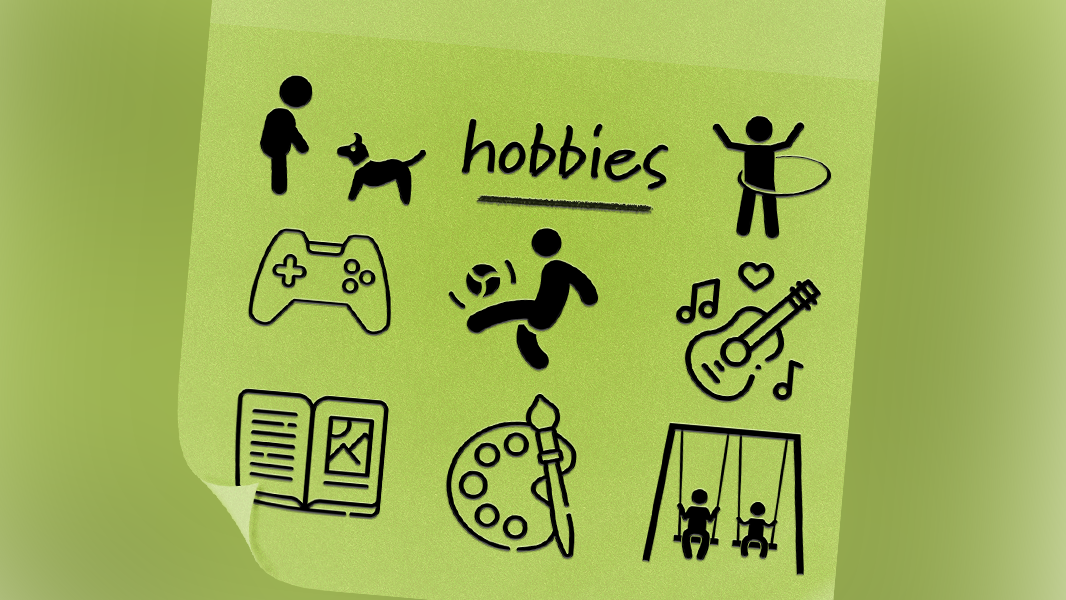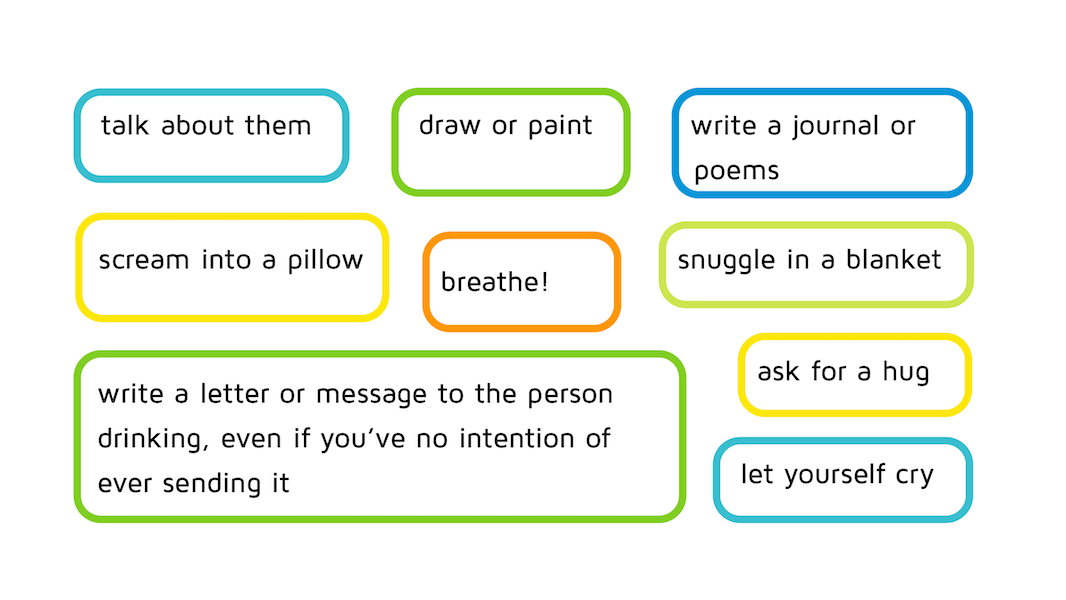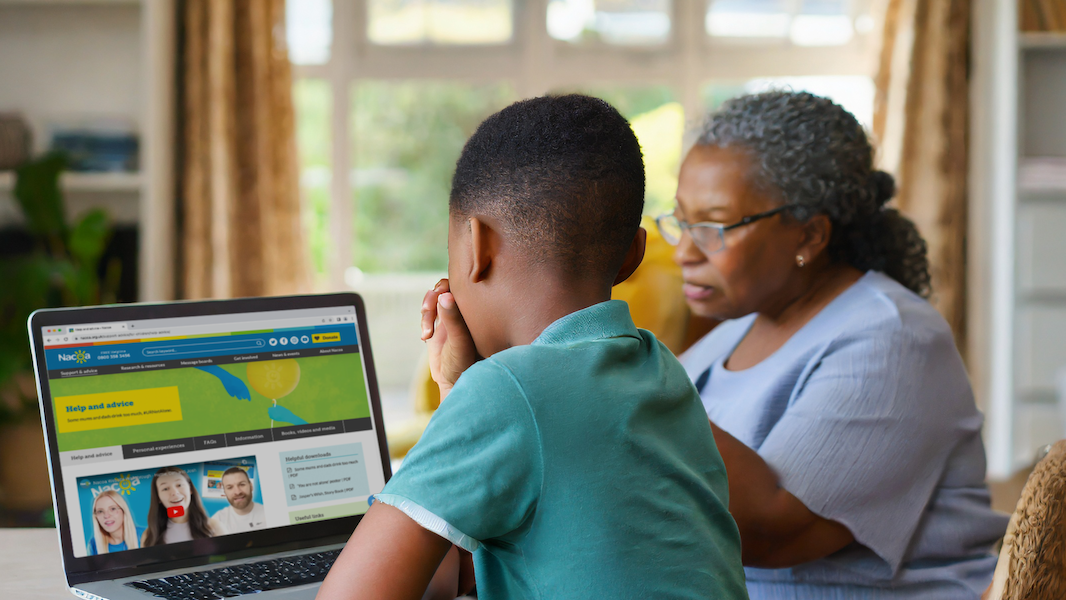

Helping grandchildren affected by their parent’s drinking
This page gives information and advice for grandparents about helping grandchildren affected by their parent’s drinking.
The impact of a parent’s drinking on children
When alcohol is the family secret, children and adults often believe that talking is being disloyal to their family and try to hide the problem from the outside world.
This can leave every member of the family feeling isolated and alone.
However hard children may try to cover up the problem, this does not mean that they are unaware of it. Children tell us they are confused when parents and family members deny the problem.
Most parents and carers who drink alcohol do so in moderation and pose no risk to their children. But if they become dependent on alcohol, it can stop them from providing safe care for their children.
The role of caring adults
Children often take on responsibility for their parent’s drinking and behaviour, believing it’s something they’ve done.
Some children spend their childhoods trying to do the impossible; stop someone else drinking.
When they know this is not their responsibility and that only the person drinking can make that choice, the burden of ‘failing’ is lifted from their shoulders, opening up an opportunity to live their own lives, irrespective of whether their parent continues to drink.
As a grandparent, you can help them learn that the world can be different from the one they have always known; there is help and there is hope.
Many children remain in the care of their parents. However, 200,000 children in the UK are being raised by relatives or friends, known as kinship care, with 60% living with a grandparent(s).
Whether you live with your children and grandchildren, see them regularly, or do not see them at all, we are here to help.
Research suggests that children whose parents who drink too much are at greater risk of developing problems. However, studies also show that the sooner children are given information and support, the better able they are to develop resilience and make healthy choices.
“I talk about my mother’s drinking today because I want children to know that they are not alone, that they are not responsible for their parent’s drinking and that they can do more than just survive.”
Geraldine James, Actor and Nacoa Patron
When drinking becomes a problem
- When people regularly drink too much, they can develop an alcohol problem or addiction, often referred to as alcoholism. The medical term is alcohol use disorder.
- Alcohol problems can affect people of all ages and from all walks of life.
- Alcohol problems are like an illness, where the person has lost control over their drinking. They continue to drink despite it having a negative effect on their lives, their health, and those around them.
- People don’t set out to have an alcohol problem, or to hurt themselves and their families. Some start drinking socially and end up drinking heavily. Others may drink to forget problems in their lives, such as with work, relationships orfinances, or to reduce anxiety.
- The slide into problem drinking can be gradual as they come to rely on alcohol more and more. They usually need help to stop.
- Often the person drinking doesn’t realise they have a problem. Even if they become aware something is wrong, they may not think it has to do with drinking.
- They may blame other people or problems in their life. This is sometimes referred to as being ‘in denial’. Whatever anyone says, you are not responsible for someone else’s drinking.
- Drinking often becomes their focus. Alcohol is seen as the solution to their problems. They can become secretive and adept at explaining away how much they drink, when and where. The need to drink takes priority over everything else, including those they love.
- Grandparents need support too. Finding out about alcohol problems and the effects on the family is an important step.

Alcohol and the family
- Alcohol problems do not only affect the person drinking, but also everyone around them, including family and friends.
- As the person drinking organises their life around alcohol, families adapt to cope with the drinking and associated behaviour.
- The family rules don’t talk, don’t trust, don’t feel develop to keep the problem hidden from the outside world and protect the illusion of a ‘normal’ family.
- Although some children are more resilient and better able to find ways to cope, all children are affected.
- This is not what parents want for their children but keeping secrets creates a false reality where there is no place for honesty. It is difficult for children to ask for help even though they know there is something wrong.
- If someone important to you has a drink problem, it can affect you at all ages, even if you are not living in the same house or they are no longer drinking.
What grandparents can do to support grandchildren when their parent has an alcohol problem

Be there for them
Don’t underestimate how important it is for grandchildren to know they have a caring grandparent in their life.
“My nan was always my hero, she’d always support me and stand by my decisions. She would constantly take me in when I had been kicked out, she would let me cry and cry, never judged me and would always take my side.”
Jen
Listen non-judgementally
Reassure them that it’s OK to talk about their experiences and feelings. It’s not being disloyal to their parent. It’s an important part of looking after themselves and will help them to feel less alone.
If they talk to you, allow them to talk at their own pace, in their own time and without interrupting.
Try not to make negative comments about their parents. Alcohol problems are not about lack of love or willpower, and children do not want their parents to be judged.
“I was fiercely protective of mum. I would be very upset if people spoke to me about her in a negative light, even if it was coming from a family member.”
SJ
Encourage them to talk about other things too, like their day at school or something they watch on TV.
Many children fear they will not be believed. When you acknowledge their experience, you will validate their feelings, help them make sense of the chaos and understand that it’s not their fault.

Help them do things they enjoy
Remind them that they are important. Sometimes worries can take over. Taking a break can help.
Encourage them to find time for activities they like, whether it’s sport or hobbies, going for a walk, reading a book, watching TV or gaming, or meeting up with friends.
Perhaps you could invite them to spend time with you, offer practical help such as picking them up from school, or help them find an after-school, youth or sports club, or activity for the holidays?
Activities provide the opportunity to develop relationships with safe people outside the home and give a sense of accomplishment and independence.
Help them express feelings
Let them know it is OK to feel however they are feeling. Feelings come and go.
Here are some ideas to let feelings out:

Talk to them about alcohol problems
Help them to understand that everyone is affected when parents drink too much. Be prepared to answer questions honestly. It can be helpful to relate to real-life events or things on TV, in books etc.
It’s good to say when you don’t know or don’t have the answer. It’s empowering for children to know that adults don’t know everything, but can find other people and places who can help.
Respect their wishes if they don’t want to talk about the problems.
“Our granddaughter is struggling with her mummy’s alcohol problems. She is safe living with us and has contact with her Mum, but it is so difficult knowing if we’re saying or doing the right things.”
Cathy and Len, Grandparents

Key messages for grandchildren
Let them know…
- Their parent’s drinking is not their fault.
- Sometimes alcohol makes people do or say things that theywould not normally do.
- Alcohol problems are like an illness where people have lost control over their drinking. They continue to drink even when it is affecting their lives, their health and people around them.
- People with alcohol problems usually need help to stop. There is help, but as hard as it is for those around them, only the person drinking can make the decision to accept help.
- They can’t control their parent’s drinking. Don’t hide bottles or try to be perfect.
- They can feel better whether their parent drinks or not.
- Many families keep alcohol problems a secret, so it can feel like they are the only one going through this. 1 in 5 children in the UK live with a parent who drinks too much.
- It is OK to talk about what’s going on and how they are feeling. Talking with someone they trust is not being disloyal to their family and can help them feel better. It could be someone in their family, a friend, a teacher or someone else.
- They are not alone. There is help. You are there for them, and they can always talk to Nacoa.
Encourage them to remember the six Cs
I didn’t cause it
I can’t cure it
I can’t control it
I can take care of myself
I can communicate my feelings
I can make healthy choices

Help them access resources and support
Seeing what it’s like for others in similar situations can help children feel less alone.
They can read experiences on Nacoa’s website, talk online on the Nacoa message boards, or access other support such as listed below.
We are here for your grandchildren and you.
“My grandson has always refused to talk about his dad’s drinking. However, I gave him the Some Mums & Dads Drink Too Much leaflet and upon reading it he said “Gran, that’s me”.”
Doreen, Grandmother
Books
- Jaspers’s Wish
- Will you Catch Me?
- Hey, Kiddo
- A Grandfamily for Sullivan
- Dennis lives with Grandma and Grandpa
- Grandparenting the Children of Addicted Parents: Experiences and Wisdom for Kinship Carers
Online resources
Videos
Other sources of support:
- Kinship – support and advice for kinship carers
- Adfam
- Al-Anon Family Groups
- Child Law Advice by Coram Children’s Legal Centre
- Citizens Advice
- DrugFAM
- Family Lives
- Family Rights Group – for families of children involved with social services
- National Organisation for FASD
- Scottish Families Affected by Alcohol & Drugs

Keeping your grandchildren safe
When alcohol becomes the priority, parents may become less emotionally and physically available for their children.
The family rules don’t talk, don’t trust, don’t feel develop to protect the illusion of a ‘normal’ family. This can make it difficult to talk about problems.
Children may witness violence and aggression. Family roles can change, resulting in children taking on additional responsibilities such as cooking, cleaning and caring for their parents or siblings. This altered family system can contribute to an increased risk of abuse.
By speaking out, children are being very brave and risk being isolated by their family.
- Reassure them that it is OK to talk and allow them to do this in their own time. Giving them the opportunity to be heard and believed can help them understand it is not their fault.
- Help your grandchildren to make a list of people they trust to call when there are problems at home. Teach them how to call 999 in an emergency.
- It can be helpful for children to have somewhere to go when needed. If you are unable to provide this, your grandchildren may have friends they could go to.
- Having a quiet place to do homework or have time away from home may be helpful. You could research after-school clubs or find out if there is somewhere at school to do homework.
“I have happy memories of being at my grandparents’ house. We’d stay there every Saturday night, and be there for Sunday lunch, because that was always the worst time for my Dad.”
Rehana
Should you make a report to social services?
Reporting child abuse is never easy, but one of the worst things we can do is nothing.
If you are concerned for the safety and wellbeing of your grandchildren, call your local Children’s Social Care and ask to speak to the duty social worker or phone the NSPCC (0808 800 5000).
You can also talk things through with Nacoa’s helpline counsellors.
Children are often wary about the situation being taken out of their control. Try to keep them informed about what you can do and who else you need to talk to.
Remind your grandchildren that if they are frightened, they can contact Nacoa or ChildLine (0800 1111) for help.
When a referral is made to social services, they may contact others for input, such as schools or GP. Social workers will not blame
you if they find no evidence of abuse, preferring to be alerted unnecessarily than fail to protect a child.
Should your grandchildren live with you?
Many children are cared for by a relative or friend. Sometimes this happens through an informal arrangement with the child’s parent and at other times, children are placed there by the local authority. For places to get legal advice and support, see p10.
Children often feel responsible for parents and worry about what might happen if they weren’t there to look out for them (or their siblings). Try to communicate openly and consider their feelings.
How can you help your grandchildren when their parent doesn’t let them to talk to you?
It can feel heartbreaking to be refused contact with grandchildren. You can call Nacoa and we will research services that offer support for family feuds and relationships.

Supporting the parent who has an alcohol problem
Support is available for people who need help to stop drinking, but the person has to accept that they have a problem and want to stop.
To talk to someone about their drinking, find a time when they
are least likely to have been drinking and you are in a safe, private place. Avoid confronting them in front of your grandchildren.
Express your concerns in a caring way. Try not to judge them. Some people react negatively to labels such as “alcoholic”, so you could talk about drinking more generally.
Focus on your feelings rather than their actions, e.g. “I am worried about how much you’re drinking”, not “You’re drinking too much”.
Do not use your grandchildren against the parent who drinks. It might result in them not allowing you to see them and places your grandchildren in an impossible position with their parents.
Try not to cover up or clear up after the person drinking. It can be helpful for them to see consequences of their behaviour and may be less exhausting for you. You are not responsible for their behaviour.
Find out about support services so you have information if they want to stop or cut down their drinking. It is not your responsibility to make them get help, but it can be useful to know what is available.
When people are dependent on alcohol, stopping drinking suddenly can be dangerous, so it is always safest to seek medical advice.
Many agencies help families too. This gives everyone support to learn to live with changes resulting from someone stopping drinking.
“My daughter drinks and is frequently not in any fit state to look after my grand-daughter. I don’t know what to do to help. I’ve tried arguing, staying away or giving lots of support. Nothing seems to make any difference. She will be sober for days, even weeks sometimes and then wham! Off she goes again.”
Roxanne

Looking after yourself
Be kind to yourself
- There’s no right or wrong way to be when coping with alcohol problems in the family. Some days will be easier than others.
- Be as involved as is right for you. Everyone’s situation is different, whether that’s the distance you live from your family, family dynamics, or other constraints on your time.
- If distance and time are issues, just being there on the phone, Facetime or other forms of contact for your grandchildren can make a world of difference.
- Perhaps there are other people you could ask to help support your children or grandchildren with practical tasks or respite care.
Look after you
Hearing about children living in a difficult situation can be distressing. If someone has talked about upsetting or abusive situations, it is natural to feel shocked or angry.
Make use of appropriate support networks to take care of yourself.
You are playing a critical role in your child’s and grandchildren’s lives. Just as you value them, you need to value yourself and be aware of your needs.
As the aeroplane analogy goes, it is vital to put on your own oxygen mask before helping others. You can’t pour from an empty cup!
Remember, you can always talk to us at Nacoa.

























































































